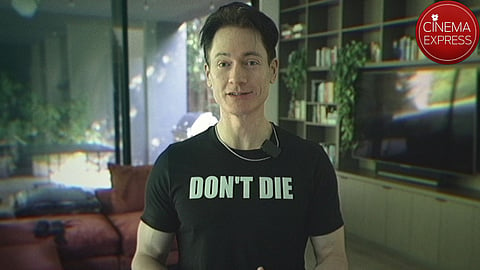Don't Die Documentary Review: Addresses contemporary psychological issues better than longevity research
Don't Die(2.5 / 5)
Fiction has been strangely obsessed with the idea of immortality. From Sauron in The Lord of the Rings to Voldemort in Harry Potter, we see epic tales of super-powered beings and evil scientists who bend the natural order of the world to cheat death. However, more often than not, those who pursue immortality have been shown as antagonistic forces in these stories. Interestingly, the recent Netflix documentary, Don’t Die: The Man Who Wants to Live Forever, makes a strong case for the opposite, by documenting the life of tech entrepreneur Bryan Johnson and his pursuit to stop ageing.
Director: Chris Smith
Cast: Bryan Johnson, Talmage Johnson
Streamer: Netflix
Through cutting-edge technology and scientific research, Bryan Johnson has curated a rigorous routine and diet for himself, which he believes will reverse his ageing. Towards the end, the documentary claims that the 47-year-old has slowed down his rate of ageing by 0.64. While the documentary diligently tries to address the criticisms against Johnson, it seems like a carefully constructed structure to avoid its own biases, a pursuit in which it seems to have failed. Allegations about Bryan Johnson being a scam artist who only wants to sell products are neatly glossed over and questions regarding the veracity of his products are not addressed through a critical lens. The entrepreneur seems to be as obsessed with his social media presence as he is with the science, which is evinced by the fact that we see his Chief Marketing Officer having more presence in the documentary and spending more time with Johnson than longevity experts. Our suspicions regarding the documentary’s bias reach a crescendo when it ends with Bryan Johnson amassing hundreds of followers and the credits roll to upbeat techno music. From a concoction of more than a hundred pills a day, a strict exercise regimen, electric to laser therapies, and dangerous gene therapies, Bryan Johnson goes through an extraordinary list of longevity procedures in his pursuit to reverse ageing. However, the science and technology shown interest us less than the layers of subliminal themes that seem to organically emerge. What sticks out the most is his relationship with his son Talmage. Johnson’s obsession with youth and his extremely affectionate relationship with his son are shown in tandem. Even as he receives plasma from his son, it is shown as a moment of father-son bonding. Johnson’s ultimate goal is strangely, and almost lightheartedly, addressed as his pursuit to start a cult-like movement.
While it might not have been the documentary’s intention, it does shine a light on a number of other interesting and relevant topics. On how he arrived at the foundational philosophy for his life-consuming mission, Brian Johnson talks about how the world, with its hyper-trained algorithms, controls our every desire and impulse. He also talks about a particularly rough time in his life in which he lost all wish to exist. All of this combined to lead him to the conclusion that he should stop listening to his mind. In order to beat the algorithms, which have taken over his mind, he surrenders himself to algorithms trained to optimise every organ in his body. The documentary inadvertently becomes a portrait of a man who has dedicated exorbitant amounts of time, energy, and resources to not just outrun death but his own mind. This might signal a time in history where humanity’s only hope of freeing itself from the clutches of a complicated, technologically gripped modern life, lies again in the hands of technology. In that way, if not a portrait of the pinnacle of science, Don’t Die: The Man Who Wants to Live Forever might end up becoming a potent psychological case study in the future.

